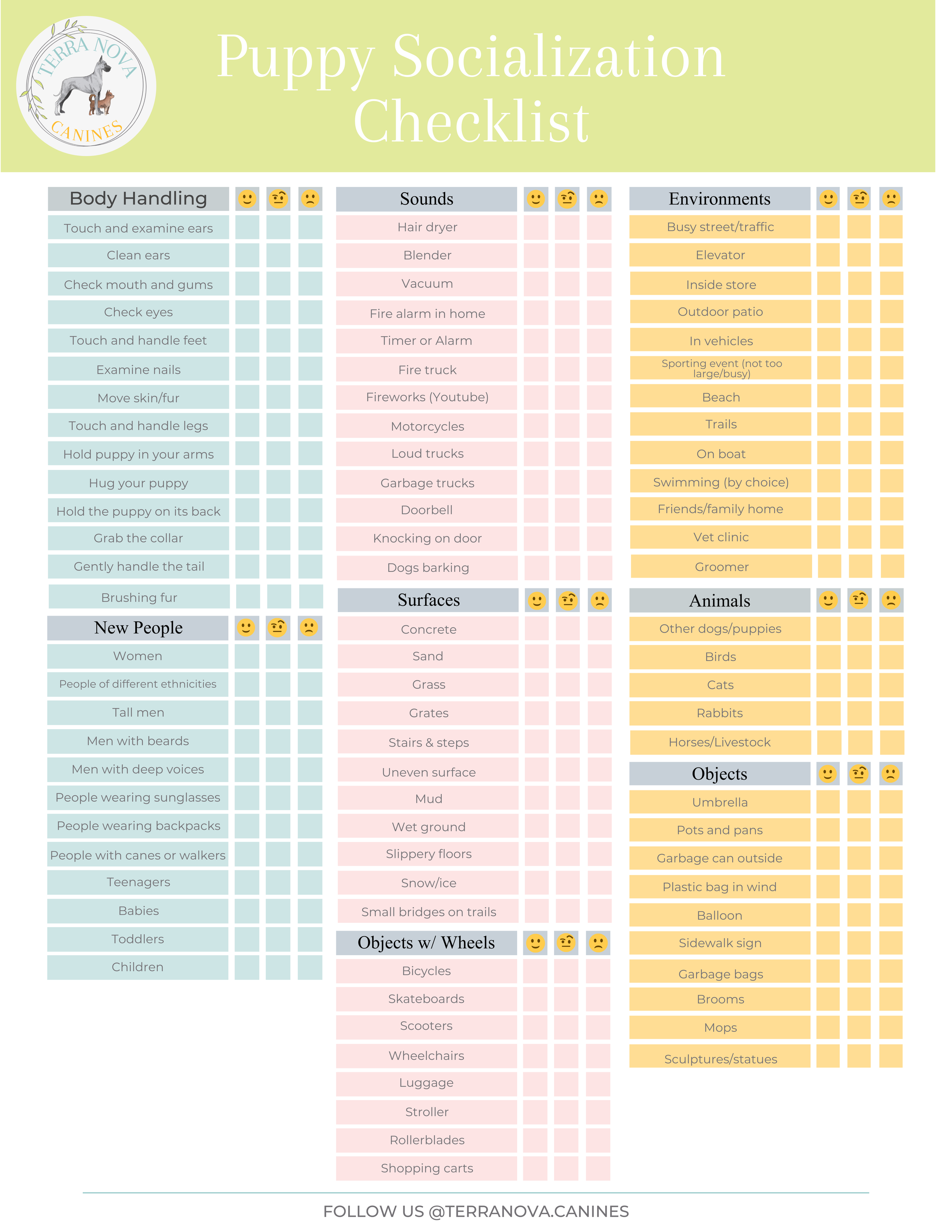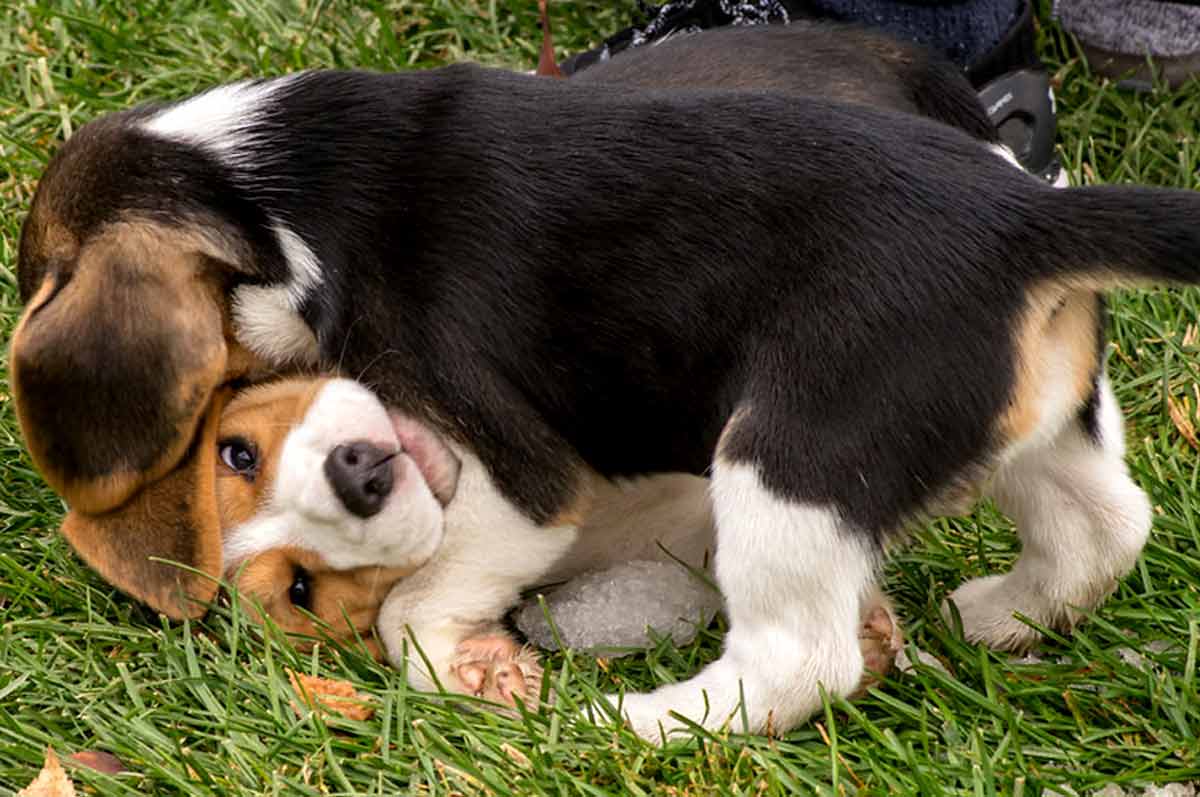How to socialize your puppy? Effective socialization is a fundamental aspect of raising a well-adjusted and confident puppy. This multifaceted process entails gradually introducing your furry companion to a diverse range of experiences, environments, and stimuli. The key is to navigate these encounters with patience and positivity, ensuring your puppy associates each new situation with a sense of curiosity and calmness.
Broadening Horizons: Diverse Experiences and Encounters
A successful socialization journey involves exposing your puppy to a rich tapestry of experiences. This includes interactions with individuals spanning all age groups, encounters with fellow canines, and introductions to a variety of other animals. Furthermore, it extends to acquainting your pup with different places, diverse noises, various surfaces underfoot, and the nuances of being handled. By exposing your puppy to transportation methods, objects, and an array of situations, you equip them with the skills needed to thrive in the world.
Patience and Positive Reinforcement: The Key to Success
Throughout the socialization process, patience and positive reinforcement are your most valuable tools. Approach each interaction with your puppy as an opportunity for growth. Reward calm and inquisitive behavior with treats, toys, or words of praise. This encourages your puppy to view the world with curiosity rather than trepidation. Dog accessories on Amazon.
Tailoring Socialization to Your Unique Context
Recognize that socialization is not a one-size-fits-all endeavor. Tailor your efforts to suit your specific location, lifestyle, and, most importantly, your puppy’s individual needs. This personalized approach ensures that your puppy encounters situations and environments relevant to their future experiences.
Navigating Fear and Anxiety: Turning Setbacks into Successes
It’s natural for puppies to occasionally display signs of fear or anxiety during socialization. When faced with such moments, it’s perfectly acceptable to take a step back and provide reassurance. Transform these setbacks into opportunities for growth by employing treats, toys, or verbal praise to create a positive association.
The Importance of Puppy Socialization
As a new puppy owner, the concept of socializing with your furry companion can initially seem like a daunting task. However, it is a crucial aspect of raising a well-adjusted, happy, and healthy dog that can confidently interact with both people and other animals. The puppy socialization period, which typically spans up to 16 weeks of age, is a critical phase in your dog’s development, shaping its future behaviors and responses to various stimuli. To facilitate this process and make it more manageable, we have compiled a comprehensive puppy socialization checklist brimming with actionable tips and insights.
Foundations of Puppy Training
Understanding the fundamentals of puppy training is paramount for fostering a harmonious home life with your new four-legged companion. Puppies have their unique way of socializing, relying heavily on their sense of smell, body language, and specific vocalizations to communicate and learn about their environment. Remarkably, they begin this socialization process as early as one week old, with the critical puppy socialization period extending up to approximately four months of age. Initiating socialization should be a priority as soon as you bring your puppy home, and safely exposing them to a variety of new experiences during this period is vital.
Seeking Guidance for Successful Socialization
While socializing young puppies may present challenges, seeking guidance from your local veterinarian clinic regarding puppy socialization classes or dog socialization groups can be incredibly beneficial. As a responsible dog owner, understanding these essential puppy training tips is imperative to ensure a positive and enriching socialization process for your furry friend. By doing so, you set the foundation for a lifetime of happiness and balanced behavior in your beloved canine companion, making the effort well worth it.
When Can Puppies Interact with Other Dogs?
Isolating your puppy from other dogs is essential until they receive all their vaccinations. This practice aids in developing strong communication skills early on. Larger breeds may exhibit initial awkwardness when interacting with peers and new acquaintances.
Once your puppy is fully vaccinated, typically around 16 weeks, they can safely socialize with adult dogs and other puppies. However, avoid enrolling them in puppy classes or kindergarten until they’ve received all their vaccinations.
Caution at Dog Parks:
Exercise care when considering dog parks. These venues can pose risks for young and small dogs, including exposure to infectious diseases, parasites, and potential encounters with larger, aggressive adult dogs. It is advisable to steer clear of dog parks, even when dealing with older dogs.
Puppy socialization, while it may present challenges, remains a rewarding and pivotal journey. Dedication, patience, and a willingness to venture beyond your comfort zone are the keys to success. Embrace new experiences, and consult professionals like animal behaviorists and veterinarians when needed. As long as your pup’s well-being remains paramount, socialization can become an enjoyable adventure for both you and your furry friend. Happy socializing!
Pre-Vaccination Socialization Strategies:
Socializing your puppy before vaccinations is vital for their development. It familiarizes them with people and other animals and helps prevent the formation of undesirable habits. Socialization also imparts essential social skills.
To socialize your puppy safely, involve various people, including family and friends, in their home environment. Introduce them to different noises, such as the TV or radio, to minimize shyness when encountering unfamiliar sounds. Gradually expose them to new environments, including car rides and visits to friends’ homes. Early training in a secure, enclosed space like a backyard yields optimal results.
Harnessing Positive Dog Training:
Encourage positive behavior while introducing your puppy to novel experiences. Positive associations with people and environments help them discern appropriate conduct. Training treats serve as valuable instant rewards for correctly executed tasks. Verbal praise should accompany these treats to reinforce their accomplishments.
Addressing Shyness in Puppies:
Even well-socialized puppies may sometimes display signs of fear-aggression or excessive submissiveness. To mitigate this, introduce your puppy gradually to other dogs in small groups. Avoid overwhelming environments, and closely observe interactions.
Socializing in Small and Large Groups:
Small Groups: Consider puppy play classes as a way to socialize your pup. Match your puppy with a dog of similar size and temperament. This ensures compatibility and facilitates communication. Always request permission from the other dog’s owner before introducing your pup, and monitor the interactions closely.
Large Groups: For larger gatherings, such as day-care or boarding, opt for venues with attentive supervision and a limited dog-to-handler ratio. Ensure the handler possesses adequate credentials. Look for safe spaces where your pup can retreat if needed.
Essential Tips for Early Puppy Training Success
comprehensive puppy socialization is a vital step in nurturing a confident and well-rounded canine companion. By exposing your puppy to a diverse range of experiences and environments and reinforcing positive behavior with patience and rewards, you set the stage for a harmonious and fulfilling life together. Remember to adapt your approach to your unique circumstances and embrace any challenges as opportunities for growth and learning in your journey to raise a happy and confident pup.

Supervise Your Awake Pup: Providing Guidance and Safety
When you bring a young puppy into your home, it’s essential to establish a routine of constant supervision while they’re awake. Puppies possess an innate curiosity and an eagerness to explore their newfound environment. However, they lack the knowledge of what’s safe or appropriate. By maintaining a watchful eye over your pup, you serve as their protector and guide, preventing accidents and discouraging undesirable behaviors. This hands-on approach creates a secure and encouraging atmosphere for your puppy’s early interactions with the world.
Start Training Early: The Foundation of Learning
The early weeks of a puppy’s life present a golden opportunity for training, and this window for effective learning opens between 8 to 12 weeks of age. Missing out on this crucial phase can be detrimental to your puppy’s development. During this period, puppies exhibit an impressive capacity to absorb information and rapidly acquire new skills. Beginning training early not only instills good habits and behaviors but also lays the groundwork for their future as well-mannered adult dogs. Moreover, early training strengthens the bond between you and your puppy, enhancing your relationship and fostering trust.
Focus on One Command at a Time: Sequential Learning
While introducing essential commands like sit, stay, drop, and come is integral to puppy training, it’s paramount to emphasize teaching one command at a time. This focused approach ensures that your puppy comprehends and internalizes each command before moving on to the next. By breaking down the learning process into sequential steps, you simplify the training experience for your pup, facilitating better retention and obedience.
Positive Reinforcement: The Power of Rewards
Positive reinforcement emerges as a potent tool in puppy training. This method harnesses the influence of your voice, treats, and gentle touches to reward and motivate desired behaviors. In this way, a positive and nurturing learning environment is cultivated for your puppy. When they associate good behavior with pleasant rewards, they are naturally inclined to repeat those behaviors. Additionally, positive reinforcement nurtures a strong and trusting connection between you and your furry companion.
No Yelling or Punishment: A Calm and Effective Approach
Throughout training sessions, it is crucial to refrain from yelling or resorting to punishment as a correction method. Yelling can evoke fear and anxiety in your puppy, impeding their ability to learn effectively. Instead, focus on maintaining a serene and stress-free ambiance during training. Positive reinforcement and gentle guidance prove to be more effective and humane approaches to correct behavior and encourage desired actions.
Short and Frequent Sessions: Tailoring to Their Attention Span
Puppies are known for their limited attention spans, underscoring the significance of brief training sessions, typically lasting between 5 to 10 minutes. Nevertheless, these sessions should be incorporated frequently throughout the day. This approach caters to your puppy’s ability to stay engaged and concentrated on training tasks. Short yet recurrent sessions surpass lengthy, exhaustive ones in terms of efficacy, ensuring your puppy retains and internalizes what they’ve learned.
Use Training Treats: Rewarding Good Behavior
Training treats emerge as invaluable tools for reinforcing positive behavior during novel experiences and situations. These treats provide immediate and tangible rewards that reinforce desirable behaviors. When your puppy associates obeying commands with receiving delectable treats, they become more inclined to comply willingly. It is crucial to select appropriate treats that are both enticing and nutritionally balanced, prioritizing your puppy’s overall well-being.
By implementing these fundamental principles and tips, you lay a strong foundation for effective puppy training, ultimately fostering a well-behaved, confident, and happy canine companion. Dog accessories on Amazon.
Dog Socialization Safety
Understanding canine body language is invaluable. Familiarize yourself with it through books or online resources to ensure safe interactions. Employ humane and gentle methods, such as sound blowers, citrus sprays, or spray bottles, to manage behavior. These tools can deter excessive barking and command attention when necessary.
Conclusion: A Guide to Puppy Socialization
Raising puppies may require effort, but adhering to these socialization tips simplifies the task. These guidelines lay the foundation for your puppy’s growth into a well-adjusted, happy, and healthy dog.
Our primary aim is to demonstrate how straightforward it can be to nurture your puppy effectively. If you seek further information on puppy care, from house training to daily walks, do not hesitate to reach out. We are passionate about dogs and eager to support our readers in providing the best care and affection for their furry companions.
